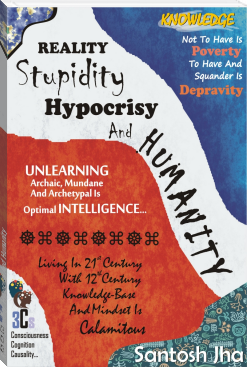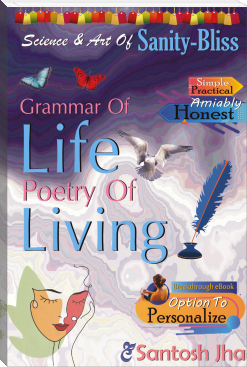Happiness Is A Scam - Santosh Jha (best books to read .TXT) 📗

- Author: Santosh Jha
Book online «Happiness Is A Scam - Santosh Jha (best books to read .TXT) 📗». Author Santosh Jha
Context of Action-Experience Cyclicality
Evolution, as it works its ways in the ever-changing expansive milieu of nature, probably was fortunate enough to have ‘retired’ as humanity embarked on the tumultuous journey of societal organization, civilizational structures and cultural functionalities. Almost similar is the functional modality of human brain, as brain has been a loyal partner of evolution in billions of years of its journey. The brain however is not as fortunate as evolution as it could not retire and continued to excel even in most precarious situations. Probably, human brain has far better and deeper control of human body and consciousness than that of the evolution on nature’s landscape. Both evolution and brain works and excels with patterns and cyclicality. Both seems to have this skilled intelligence to match and recognize the vitiation and unfamiliarity between the emerging novel and alternative patterns in the milieus, internal as well as external, and existing pattern stored in the brain plexus as innate intelligence for survival optimization. This process of pattern and cyclicality is a huge casualty in modern human external milieus of society-cultures and polity. The embedded and predominant cyclicality about decisive and fixed pattern is hugely missing in modern milieus. For example, a certain behavior may not fetch the same response in different groups of people in a society and culture. Very naturally, the experiences, which a particular behavior would elicit in the external milieus, are varied and unpredictable. This especially happens with almost all good and normal behavior. In contemporary human milieus, trust, honesty, compassion, brotherhood, equitability et al, often receives such experiences, which are not only varied but also largely make one feel unrewarded. Human brain and evolutional strategy is to register experiences and convert them into long term memories, affecting deep attitudes and personality, based on the benchmark of reward and punishment emotions. The hormonal structures work on the straight basis of pleasure and pain. If there is predictability in good behavior of a person getting back good rewarded feelings in reciprocation; the brain has ease in installing a pattern with experiences and memories. Sadly, this does not happen in contemporary human milieus. The brain stands confused and conflicted as good behavior gets a varied and often conflicted reciprocation from external milieus. Almost all the benchmarks and patterns of good-bad, right-wrong, normal-abnormal, et al are now so massively scammed that human brains have trouble establishing a pattern for experience and memory creation. It seems; the human brain of modern men and women has now accepted that faking and fudging is the best artistry and intelligence. Average human brain has found new utility and ‘peace’ in abstractions, fudged factuality, fake reality, mediocrity of ambivalence, et al as contemporary benchmarks of successes. It is therefore a probability that human brain now works out the crucial and critical function of experience creation and cyclicality management in a way, which is conditioned to, attuned to and in sync with overall scammed perceptional cosmos of human world. If we look at average people and seek to establish a pattern in their routine daily life-living behavior-action, we can easily see and realize how unpredictability and insincerity have become hallmarks of ‘right and appropriate’ consciousness. This affects the perception of reality as well as processing of decision-making by brain states.
These aspects of our life-living, we have deliberated in detail only to have a perspective of how complex and complicated this entire process of perception of reality is and how there always are ever-present probability of vitiation, depravity and abstractions in our perception making process. The idea is to have the necessary feel of many aspects of reality at brain levels as well as at milieu levels. As we have discussed these aspects of brain processes of perception, their conversion into decision-making and the interactions of these decisions with external milieus of society-culture-polity to engender experiences and memories; we shall have better insights into why the way we perceive reality and accept them, can be fudged, fake, abstracted, vitiated and susceptible to unpredictability of normality. These are ingredients of probability of scams. With this preparedness, we now enter the final stage of this eBook and begin to deliberate over the hypothesis that Happiness Is a Scam.
**
Happiness as Scammed Perception of Reality
As we have already detailed the mechanisms and process of brain system creating perceptions for us and the challenges of these perceptions not being simple, linear and singular; we shall straightaway move to different probabilities, which may prove our hypothesis that happiness, as we all perceive, may not in most cases be true, right and real. We list out different situations and processes, which probably makes Happiness as something of a scammed perception. Here we go –
Happiness is a perceptional state. This means; it is not a specific and fixed tangibility. Instead; happiness is an emergent intangibility, which brain states accept as useful and fruitful for optimizing survival potential. This word called ‘survival’ needs to be broad-based to include its different shades in modern life-living milieus. We use the term survival here as a superordinate reality. This clearly means, happiness is rooted not in external object or situation but in the acceptance of mind consciousness. Very naturally, happiness is decisively subjective, depending upon how a person’s perceptional universe has evolved since his or her birth. Given that reality is considered as something singular and objective; happiness simply cannot qualify as reality. However, new age science accepts all realities only as probabilities. In that sense, Happiness is a Reality as Probability. This probability is largely perceptional. Perceptions are person-specific and conditioned by experience historicity of the person and his or her long term memory. Perceptions are also emergent and ever-evolving intangibility. This means, the sense and perception of happiness may change as a person evolves and grows. As we have detailed earlier that perceptions are heavily ‘contextual’ to external milieus of society-cultures-polity, it is always very likely that a person’s perception about happiness is conditioned by populist and dominant cultural benchmarks. Perception of happiness changes as ‘context’ of the perception in external milieus change. It in turn suggests that a person has very little role in deciding his or her own happiness. This reality of happiness is very much like love. The so-called ‘subjective’ element in one’s perception does not mean that the ‘subject’ is the person. In fact, the subject is ‘society-culture-polity’. A person may feel pleasured and sense of happiness in non-vegetarian food, as he or she has been habituated to eat them since childhood. In another family or in another culture, a person may feel disgusted and sadness, when given the same non-vegetarian food. Therefore, because of different ‘contextual’ backgrounds, the experiences and memories of two persons vary and they result in different perceptions about a singular reality. The sense and feel of happiness of one person faced with same situation, is sense of disgust for another. Non-vegetarian food is common and objective. Reality may be singular but its perception is probabilistic. The perceptions are subjective but the subject is not individual. It is the society-culture-polity, which alters the ‘context’ of experiences and memories of a person. Happiness is not reality; rather, a probability as it is perceptional. It is perception and this perception is precarious as the cosmos of perception about happiness is huge and complex. Therefore, it can be hypothesized that whether a person is happy or not is not decided by him or her but by external milieus and its perceptions, installed as synthetic intelligence in his or her mind consciousness since childhood. In reality and in ideal situation; happiness must be decided by individual and happiness must be objective. It is not. As we have talked earlier; 98 percent of decisions of daily routine life-living are not conscious. That is probably why happiness perception is also majorly not consciously realized and decided. This situation is a scam situation. It is a scam because happiness is so precious and primary need that every person should ideally have everything about happiness in conscious domain. In reverse; 98 percent of happiness are not automatically perceived and consciously decided. People accept happiness as so very crucial in life and always invest best of time and resources chasing happiness. It is such a tragedy that they are not deciding their own happiness and also, they do not consciously feel happiness; even when it is very much there and processed by subconscious brain states of limbic system. This in turn also mean that there may be a vast domain of happiness and diverse dimensions of happiness, which remains unknown and untapped to most people as they do not become available to their subjective perceptional universe. They only perceive those happiness, which have imprint of experience and memory in their brain states. This can be understood with the help of an analogy of our modern banking transactions. Someone deposited a million dollar in your bank account and the bank showed it up in your account statement by merely putting some numbers. The actual money was not placed in your hands and you could not feel the tangibility of million dollars. The money however happened. May be, you were busy or otherwise not in the habit of checking your bank statements, you could not feel the ‘Happiness’,





Comments (0)